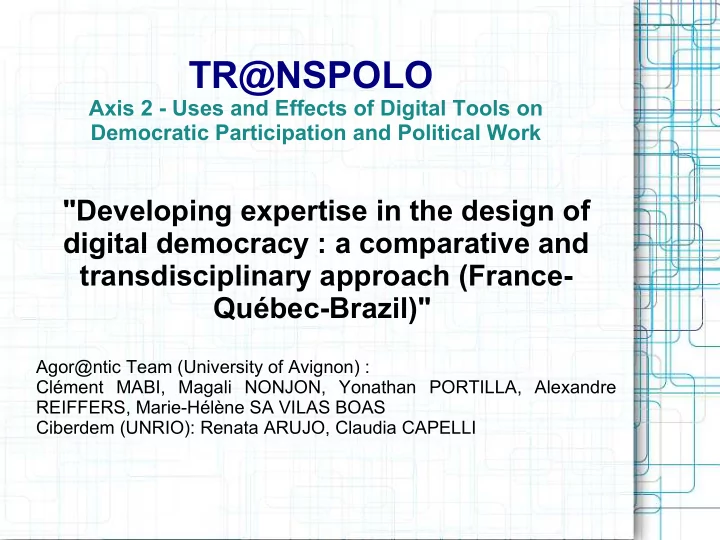

TR@NSPOLO Axis 2 - Uses and Effects of Digital Tools on Democratic Participation and Political Work "Developing expertise in the design of digital democracy : a comparative and transdisciplinary approach (France- Québec-Brazil)" Agor@ntic Team (University of Avignon) : Clément MABI, Magali NONJON, Yonathan PORTILLA, Alexandre REIFFERS, Marie-Hélène SA VILAS BOAS Ciberdem (UNRIO): Renata ARUJO, Claudia CAPELLI
To introduce ● A special meaning of transparency : “it should not only provide information to the governed people but also increase interaction between state and citizens” (Meijer, 2012) ● Transparency and e-democracy ● One focus : digital participatory tools and design (the digital participatory budgeting, the OGP approved experiences, e-democracy community)
Our questions ● Do participatory devices reinforce the opening of the decision-making process or should they only be understood as tools of marketing that sustain conventional and hierarchical decision- making mechanisms ? ● How the diffusion of these digital participatory tools contributes to the development of a digital participatory expert network (scientist and professionals) ?
A transdisciplinary approach ● Combine expertise of system ingeneering, complex network, games theory, computer sciences, data mining, communication studies and political sciences
3 axis ● 1- How to evaluate and improve digital participatory tools ? ● 2- Digital tools of participatory democracy : a political device ● 3- Digital participatory design and tools : circulation, diffusion and professionalization
1- How to evaluate and improve digital participatory tools ? ● A common belief that deserves to be questioned : it's sufficient to provide a participatory tool to generate citizen participate ● A case study : evaluate and test the effects of the functionalities used in the case of the Brazilian digital participatory budgeting
Digital Participatory Budgeting in Brazil ● An online version of a famous institution in Brazil, initially based on face-to-face assemblies ● One common purpose : involving inhabitants in the allocation of part of the investment budget ● Twenty digital PB in Brazil ● Several design : digital PB do not garanty in the same way transparency and participation
The digital Participatory budgeting of Belo Horizonte
Two challenges ● Study the design of each digital PB to understand which kind of transparency and participation model is promoted ● Identify and develop functionalities that could enhance the democratic quality of digital participatory tools and design
How to compare ? the contribution of Ciberdem team
2- Digital tools of participatory democracy : a political device ● Developping collaborative research between Ciberdem (UNRIO) and Agor@ntic (University of Avignon) teams ● Bringing the expertise of political sciences and communication studies to better understood which kind of transparency and participation model is promoted in the digital participatory tools
Two assumptions ● Each digital participatory tools is a political device (Barry, 2005) ● There is a cultural anchoring of technologies
Supply the contribution of the ciberdem's team ● Identify the actors who develop, promote or use the digital participatory tools (professionals, scientists and civil society) ● Focus on the meanings and the representations given to these tools by these actors ● Study the political and sociological context in which these tools are developed
Two qualitative and field surveys ● Digital participatory budgeting in Brazil : 3 case studies (Belo Horizonte, Porto Alegre and Rio Grande do Sul state) ● 1) Conceptions of participation : Do digital participatory budgetings value an individual or a collective mobilization ? Is it based on traditional forms of participation (vote) or alternative ones ? ● 2) Actors : Who contributes to the circulation of this tool ? Does this circulation go with a standardization of the design?
Two qualitative and field surveys ● The OGP approved experiences (France, Brazil and Quebec)
Data.gouv.fr
3- Digital participatory design : circulation, diffusion and real impact Two main studies ● The E-Democracy Researchers Network (CV lattes) ● The Facebook E-Democracy Community (Netvizz)
The E-democracy researchers network ● Study the spread of digital democracy and participatory tools in Brazil, France and Quebec ● Our hypothesis : scientists play a key-role in the promotion of digital democracy...they are also a vector of standardization and commercialisation of digital democracy ● The CV lattes data base
The CV lattes data base
The CV lattes data base
The facebook e-democracy community ● This community has two components: Facebook page owners (Leaders) and Subscribers (Followers). ● Study the impact of the interaction between: A Leader with a Leader A Follower with a Follower A Leader with a Follower
A macroscopic perspective
A microscopic perspective ● Evolution of the interaction between subscribers ● Evolution of User Expertise in E-Democracy ● Interaction between subscribers and page owner
Thank you !
Recommend
More recommend